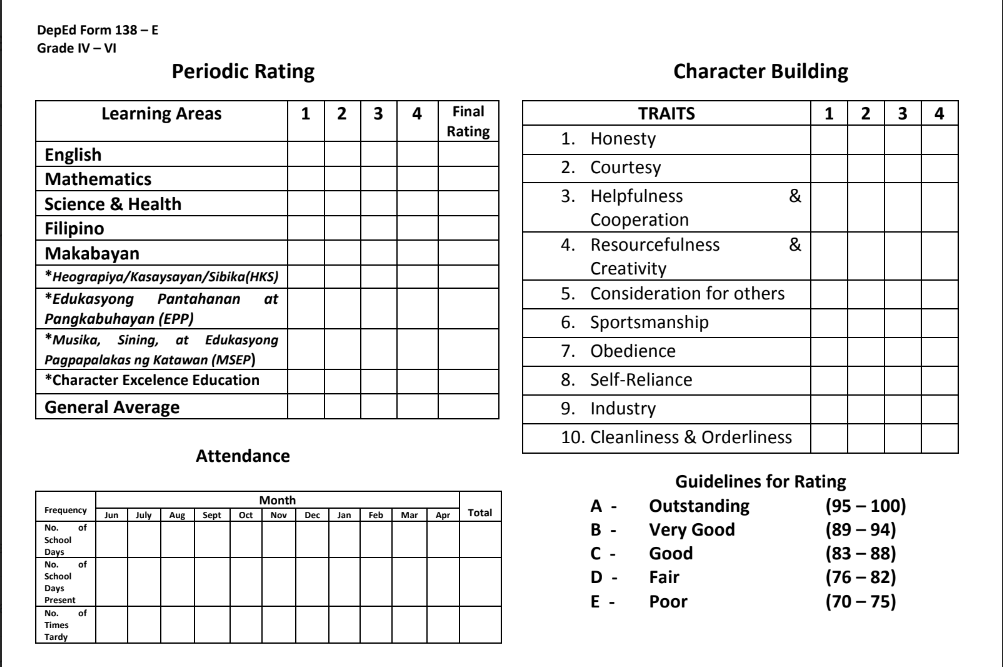Education plays a vital role in shaping individuals’ lives, and formal documentation is an essential aspect of tracking and assessing academic progress. One such document commonly used in educational institutions is Form 138, also known as the Permanent Record Card. This article aims to comprehensively understand Form 138, its purpose, and its significance in the educational system.
What is Form 138?
Form 138 (also known as the Report card) is a standardized document used in many countries especially in the Philippines to record and evaluate a student’s academic performance and progress throughout their school years.
It is typically issued by educational institutions at the end of each school year or term and serves as an official report card. Form 138 contains valuable information such as grades, attendance records, and other relevant academic details.
Form 138 Sample
Deped Form 138
Credit to the Owner
Purpose of Form 138
The primary purpose of Form 138 is to provide a comprehensive overview of a student’s academic performance, enabling educators, parents, and students themselves to assess their progress over a given period. The document serves multiple functions:
- Evaluation of Academic Performance: Form 138 presents a detailed breakdown of a student’s grades in different subjects. It allows educators to evaluate the student’s performance and identify areas of strength and weakness. This information can aid in the development of appropriate teaching strategies and interventions.
- Monitoring of Attendance: Regular attendance is crucial for academic success. Form 138 includes attendance records, providing an overview of a student’s punctuality and attendance rates. It helps identify patterns of absenteeism and promotes the importance of consistent school attendance.
- Documentation for Transfers: When students transfer to another school, Form 138 serves as a crucial document for the receiving institution. It provides insights into the student’s academic history, making it easier for the new school to place the student in appropriate classes and maintain continuity in their education.
- Scholarship and College Applications: Many scholarships and colleges require academic transcripts or a record of grades during the application process. Form 138 serves as an official record of a student’s academic achievements, helping them showcase their performance and eligibility for various opportunities.
Significance of Form 138
Form 138 holds significant importance for various stakeholders in the educational ecosystem:
- Students: It allows students to track their progress and identify areas for improvement. They can use the information in Form 138 to set goals, seek additional support, or plan their academic trajectory.
- Parents/Guardians: Form 138 enables parents or guardians to stay informed about their child’s academic performance and provide the necessary support. It helps them understand the student’s strengths, weaknesses, and areas that require attention.
- Educators: Form 138 assists educators in assessing the effectiveness of their teaching methods and adjusting their instructional strategies accordingly. It provides valuable insights into students’ learning patterns and facilitates personalized instruction.
- Educational Institutions: Form 138 enables educational institutions to maintain a standardized and consistent assessment and evaluation system. It helps schools identify high-performing students, recognize academic achievements, and ensure compliance with educational regulations.
Conclusion:
Form 138, also known as the Report Card, plays a vital role in documenting and evaluating a student’s academic progress. Its purpose extends beyond being a mere report card, as it serves as a comprehensive tool for assessing performance, monitoring attendance, facilitating transfers, and supporting scholarship and college applications. For students, parents, educators, and educational institutions alike, Form 138 serves as a valuable resource in fostering academic growth, accountability, and educational continuity.
Discover more from Filesph
Subscribe to get the latest posts sent to your email.

